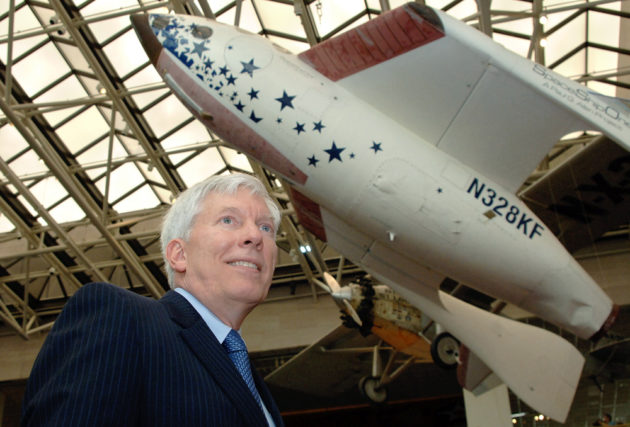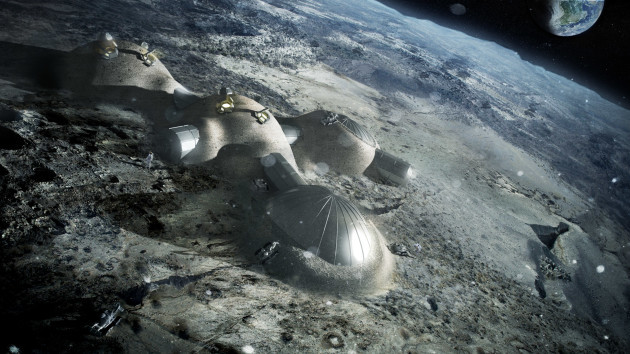GUADALAJARA, Mexico – If the world wants to create a village on the moon, the Federal Aviation Administration is willing to start up an online trading post for lunar services.
George Nield, the FAA’s associate administrator for commercial space transportation, says he doesn’t even need to wait for the village to be built.
Nield offered to set up what he called LMASS – the Lunar Marketplace and Swap Shop – during one of today’s sessions at the International Astronautical Congress in Guadalajara.
“Think of it as a corkboard,” Nield said. The potential traders could include businesses that are working on ways to move cargo from low Earth orbit to lunar orbit, or on moon landers, or on habitats, or surface transportation, or communication services, or other technologies that will eventually be needed for lunar operations.
George Nield
George Nield, the FAA’s associate administrator for commercial space transportation, pays a visit to the SpaceShipOne rocket plane in the Smithsonian’s National Air and Space Museum in Washington, D.C. (Credit: FAA file)
Nield brought up the idea of creating LMASS during a session focusing on the European Space Agency’s Moon Village concept. While NASA officials highlight the “Journey to Mars,” ESA and its director general, Jan Woerner, have been championing the Moon Village as a model for lunar surface operations.
Woerner said he saw no conflict between NASA’s Mars focus and ESA’s moon focus. “On the Journey to Mars, I think the Moon Village is a perfect pit stop,” he told the IAC audience.
This village doesn’t need a mayor, a government or even a town name, Woerner said. Rather, the village serves as a metaphor for a style of international collaboration that guarantees “free and open access” to lunar resources as bases take shape in the 2020s.

What does NASA think of all this? Deputy Administrator Dava Newman said the space agency’s push for sending astronauts to the Red Planet and its moons in the 2030s “definitely includes going from Earth, to moon cislunar [space], to Mars.”
However, NASA isn’t likely to take the lead role on the moon’s surface. Instead, the main interest in the moon is coming from other countries, and from commercial ventures. Nield said that Woerner’s Moon Village concept sparked “a tremendous reaction” from the companies that his agency serves in its role as a facilitator of commercial space activities.
Nield was particularly struck by the enthusiasm generated by SpaceX founder Elon Musk’s plan to send settlers to Mars, and the outer-space plans being pursued by Amazon billionaire Jeff Bezos’ Blue Origin space venture.
He said at least a dozen other companies are interested in moon ventures – including Moon Express, which has won the U.S. government’s preliminary go-ahead for a lunar landing next year.
“I thought, ‘Gosh, if we all get together, even informally, we might have something there,’” Nield said.
That’s what LMASS would do.
“Not everyone has to be the rocket scientist, or the explorer. We’re going to need farmers, we’re going to need miners, either human or robotic. We’re going to need people who operate these transportation systems,” Nield explained.
“If we can pick out what are our core competencies – what are the areas that we’re interested in studying, or providing, or producing – and we can collect that information, we can have the different kinds of skills and products that we’re going to need to eventually have a village,” he said.
In the beginning, LMASS could serve merely as an online database listing those skills and products.
“We’d be happy to facilitate that as an interim step,” Nield said. “Others may step forward, based on past experiences, or that is how they would like to contribute to the effort.”
Eventually, the database could turn into an actual marketplace, online or on the moon, where goods and services for the Moon Village are traded or bartered, bought or sold.
Nield said he sees the Moon Village concept as a “great opportunity for public and private partnerships.”
“This is not just a series of launches, or a series of space missions. What we need to be thinking about instead is the development of an ecosystem, infrastructure and a space economy. How can we do that in a way that is affordable and sustainable? Those will be the keys.”
